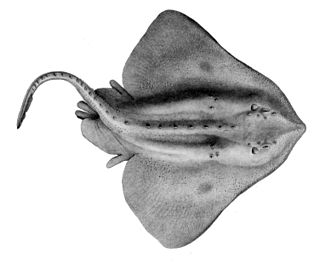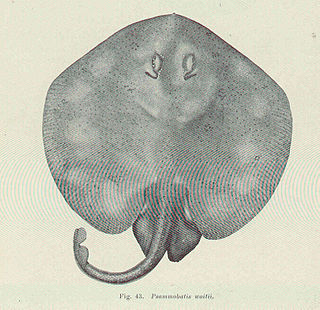
The Squaliformes are an order of sharks that includes about 126 species in seven families.
Mitsukurinidae is a family of sharks with one living genus, Mitsukurina, and four fossil genera: Anomotodon, Protoscapanorhynchus, Scapanorhynchus, and Woellsteinia, though some taxonomists consider Scapanorhynchus to be a synonym of Mitsukurina. The only known living species is the goblin shark, Mitsukurina owstoni.

Skates are cartilaginous fish belonging to the family Rajidae in the superorder Batoidea of rays. More than 150 species have been described, in 17 genera. Softnose skates and pygmy skates were previously treated as subfamilies of Rajidae, but are now considered as distinct families. Alternatively, the name "skate" is used to refer to the entire order of Rajiformes.

The guitarfish, also referred to as shovelnose rays, are a family, Rhinobatidae, of rays. The guitarfish are known for an elongated body with a flattened head and trunk and small, ray-like wings. The combined range of the various species is tropical, subtropical, and warm temperate waters worldwide.

The New Zealand rough skate, Zearaja nasuta, is a skate of the genus Zearaja, found around New Zealand at depths between 10 and 1,500 m. Its length is up to 1 m. This species has been assessed by the IUCN as of Least Concern. In June 2018 the New Zealand Department of Conservation classified the New Zealand rough skate as "Not Threatened" with the qualifier "Conservation Dependant" under the New Zealand Threat Classification System.

The shortspine spurdog is a dogfish, a member of the family Squalidae, found on continental shelves off Japan in temperate waters, from the surface to 950 m. Its length is up to 75 cm.

Dipturus is a large genus of skates native to the Pacific, Atlantic, and Indian Oceans. They were formerly included in Raja. Some species initially moved to Dipturus were later placed in Dentiraja, Spiniraja, and Zearaja.

Notoraja is a genus of skates in the family Arhynchobatidae. They are found in deep water in the Indian and western Pacific Oceans.

Raja, also known as raia, is a genus of skates in the family Rajidae containing 16 species. Formerly a wastebasket genus, many species historically categorized here have been moved to other genera in the family, such as Amblyraja, Beringraja, Dipturus, Leucoraja and Rostroraja. Raja are flat-bodied, cartilaginous fish with a rhombic shapes due to their large pectoral fins extending from or near from the snouts to the bases of their tails. Their sharp snouts are produced by a cranial projection of rostral cartilage. The mouth and gills are located on the underside of the body. They may be either solid-coloured or patterned, and most skates have spiny or thorn-like structures on the upper surface, while some species contain weak electrical organs within their tails. Mating typically occurs in the spring and the female lays numerous eggs per clutch which are encapsulated in leathery cases, commonly known as "mermaid’s purses". Species vary in size, ranging from about 40 to 140 cm (1.3–4.6 ft) in length. These bottom-dwellers are active during both day and night, and typically feed on molluscs, crustaceans and fish. Raja skates are found in the East Atlantic, also in the Mediterranean, and western Indian Ocean, ranging from relatively shallow water to a depth of 800 m (2,600 ft). Skates and related species have fossil records dating from the Upper Cretaceous period, thus this well-adapted species is quite ancient.
The spotted legskate is a species of cartilaginous fish, a ray belonging to the family Anacanthobatidae, the smooth skates. It is the only species in the monospecific genus Anacanthobatis. It is found off Mozambique and South Africa. This is a demersal fish occurring on soft substrates on the continental shelf break and upper continental slope at depths of 200–435 m (656–1,427 ft).
The Maugean skate or Port Davey skate is an endangered species of fish in the family Rajidae. It is endemic to Tasmania, only found in the brackish estuarine waters of Macquarie Harbour and Bathurst Harbour. The species was discovered in 1988 by Dr Graham Edgar. It was named in honour of René Maugé, a zoologist on the Baudin expedition to Australia, who died in Tasmania in 1802.
Gurgesiella is a genus of fish in the family Gurgesiellidae. These relatively small deep-water skates are found in the Atlantic and Pacific Oceans off South and Central America.

Irolita is a genus of softnose skates in the family Arhynchobatidae, commonly known as round skates. There are two species, both endemic to Australia, found over soft bottoms on the outer continental shelves and upper continental slopes, at depths of 50–200 m for the southern round skate and 142–209 m for the western round skate. The distributions of the two species do not overlap.

Fenestraja is a genus of eight species of skate in the family Gurgesiellidae. They are found in deeper waters of the western Atlantic and the Indian Ocean.
Brochiraja is a genus of deep-sea skates in the family Arhynchobatidae containing eight species. They are found in the waters around New Zealand and the Tasman Sea.

The Melbourne skate is a species of fish in the belonging to the skate family Rajidae. It is the only species in the genus Spiniraja. It is endemic to southern Australia. Its natural habitat is open seas. It is found at depths up to 345 meters.
The greeneye spurdog is a species of dogfish described in 2007. It is a member of the family Squalidae, found off the coast of southeastern Australia. The length of the longest specimen measured is 85.6 cm (33.7 in). It was considered conspecific with the shortspine spurdog.

The Sydney skate is a species of skate of the family Rajidae native to waters off the east coast of Australia.

The grey skate is a species of fish in the family Rajidae. It was described in 2008 by Australian ichthyologist Peter R. Last.













